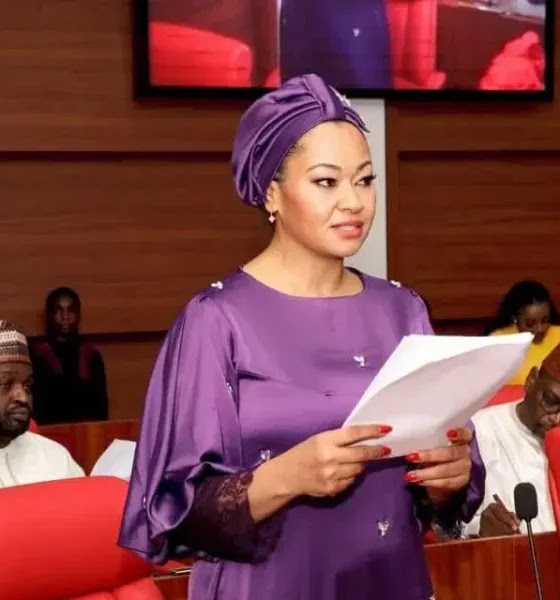In a development that has captured the attention of political observers across Nigeria, the six-month suspension of Senator Natasha Akpoti-Uduaghan, the representative of Kogi Central Senatorial District, has officially expired. This milestone, which occurred around early September 2025, marks the end of a contentious chapter in her legislative career and reopens discussions about power dynamics, gender issues, and accountability within the National Assembly. As of September 7, 2025, when Àlexa News Nigeria reported the expiration, Akpoti-Uduaghan is poised to resume her duties, but the lingering tensions from her suspension raise questions about her reintegration into the Senate floor and the broader implications for opposition voices in Nigerian politics.
Akpoti-Uduaghan’s journey to the Senate has been anything but conventional. A prominent businesswoman, philanthropist, and advocate for women’s rights, she first gained national prominence through her multiple attempts to secure political office in Kogi State. Her election to the 10th Senate in 2023 under the Peoples Democratic Party (PDP) was a breakthrough, making her one of the few female senators from the opposition. However, her tenure has been marked by bold confrontations, particularly with Senate leadership, culminating in the suspension that barred her from participating in legislative activities for half a year. The expiration of this suspension is not just a procedural event; it symbolizes resilience amid adversity and highlights the challenges faced by outspoken female politicians in a male-dominated arena.
This article delves into the details of the suspension’s end, the events leading up to it, Akpoti-Uduaghan’s background, the political context in Kogi State and the national legislature, and the potential ramifications for her career and Nigerian democracy. By examining these elements, we can better understand how this episode fits into the larger narrative of political accountability and gender equity in Nigeria.
The Announcement and Immediate Context
The news of the suspension’s expiration broke on September 7, 2025, through various media outlets, including Alexa News Nigeria, which emphasized the senator’s return to legislative duties. The suspension, imposed on March 6, 2025, was a punitive measure by the Senate, prohibiting Akpoti-Uduaghan from attending plenary sessions, entering the National Assembly complex, and accessing any official resources or privileges. This effectively sidelined her from contributing to debates, committee work, and oversight functions for six months—a significant period in the life of a senator.
According to reports, the expiration was automatic, as the Senate’s resolution specified a fixed duration without provisions for extension. However, the path to this point was fraught with legal battles and public spectacles. In July 2025, Akpoti-Uduaghan made headlines by storming the National Assembly complex with her legal team, brandishing a court judgment that she claimed mandated her immediate recall. This dramatic entrance, which involved waving documents and demanding entry, reignited public interest in her case and sparked debates about the judiciary’s role in checking legislative overreach. The incident, described as causing a “stir” in the article, underscored the senator’s determination to challenge what she perceived as unfair treatment.
Kenny Okolugbo, an aide to Senate President Godswill Akpabio, responded to these developments in August 2025, stating that Akpoti-Uduaghan’s appeal to the courts indicated the original judgment did not nullify the suspension. He remarked, “Akpoti-Uduaghan’s decision to approach the Appeal Court shows that the judgment she was relying on to return to the Senate did not nullify her suspension.” This statement highlighted the ongoing friction between the senator and the Senate leadership, suggesting that even post-expiration, reconciliation might be challenging.
Akpoti-Uduaghan herself has been vocal in dismissing the suspension as politically motivated. She has repeatedly framed it as a “witch-hunt,” linking it directly to her petition against Akpabio, whom she accused of sexual harassment. This accusation, lodged earlier in 2025, added a layer of controversy, transforming the issue from a mere breach of Senate rules to a high-stakes gender and power struggle. The expiration of the suspension, therefore, is not merely an administrative closure but a potential flashpoint for renewed confrontations.
Background on Natasha Akpoti-Uduaghan: From Business to Politics
To fully appreciate the significance of this event, it is essential to trace Akpoti-Uduaghan’s trajectory. Born in 1980 in Agbor, Delta State, Natasha Hadiza Akpoti-Uduaghan is a multifaceted figure whose life story embodies ambition and resilience. She holds a bachelor’s degree in Civil Engineering from the University of Abuja and an MBA from a European institution, which equipped her for a successful career in the oil and gas sector. As the founder of Brian Edumond Consulting, she has been involved in major infrastructure projects across Nigeria, earning a reputation as a savvy entrepreneur.
Her foray into politics began around 2018, driven by a desire to address the developmental challenges in Kogi Central, her adopted home through marriage to Uduaghan, a prominent Kogi indigene. In the 2019 general elections, she contested the Kogi Central Senatorial seat under the PDP but lost amid allegations of electoral malpractice. Undeterred, she challenged the results in court, showcasing her tenacity. This legal battle, which dragged on for years, highlighted systemic issues in Nigeria’s electoral process, including vote-buying and intimidation.
Akpoti-Uduaghan’s breakthrough came in the 2023 elections. Running again under the PDP, she secured victory in a tightly contested race against candidates from the All Progressives Congress (APC) and other parties. Her campaign focused on youth empowerment, women’s rights, and agricultural development—issues resonant in Kogi, a state plagued by farmer-herder conflicts and economic stagnation. Upon assuming office, she quickly established herself as an outspoken legislator, sponsoring bills on gender equality and rural infrastructure while critiquing government policies on security and economy.
Her personal life has also intersected with her public persona. Married to a Kogi-based businessman, she has often spoken about balancing family and politics in a challenging environment. Akpoti-Uduaghan’s style—combining professional acumen with advocacy—has made her a role model for young women, but it has also invited scrutiny and opposition from entrenched interests.
The Suspension: Triggers and Controversies
The suspension stemmed from a series of events in early 2025 that escalated tensions within the Senate. On March 6, 2025, the Senate, under Akpabio’s leadership, voted to suspend Akpoti-Uduaghan for six months. The official reason cited was her breach of Senate rules, specifically allegations of misconduct during a committee session and failure to adhere to procedural norms. However, Akpoti-Uduaghan and her supporters argued that this was retaliation for her petition against Akpabio.
The petition, filed in February 2025, accused the Senate President of sexual harassment, a grave allegation that stunned the political establishment. Akpoti-Uduaghan claimed that Akpabio had made inappropriate advances, which she rebuffed, leading to a pattern of professional sabotage. This claim was not isolated; it echoed broader conversations about workplace harassment in Nigerian politics, where power imbalances often silence victims. The Senate’s response was swift and punitive, framing the suspension as necessary to maintain order rather than addressing the harassment allegation head-on.
The decision to suspend her was passed with a majority vote, reflecting the APC’s control of the upper chamber. Critics, including civil society groups, decried it as an abuse of power, arguing that it stifled dissent and protected the leadership from scrutiny. During the suspension period, Akpoti-Uduaghan was effectively erased from legislative proceedings, missing key votes on the 2025 budget and national security bills. This absence not only limited her constituents’ representation but also amplified calls for Senate reforms.
In August 2025, Akpabio escalated the rhetoric, urging Akpoti-Uduaghan to “tender an apology” for her actions. He stated, “The Senate is not a reality show,” implying that her public displays and legal maneuvers were theatrical and disruptive. This comment drew backlash from gender rights advocates, who saw it as dismissive of legitimate grievances. The July 2025 incident at the National Assembly further intensified the drama: Akpoti-Uduaghan’s arrival with lawyers and the court judgment she wielded was interpreted by some as a bold assertion of rights, by others as grandstanding.
Legally, the suspension faced challenges. Akpoti-Uduaghan approached the courts, securing interim orders that questioned the Senate’s authority. However, as Okolugbo noted, these did not fully overturn the suspension, leading her to appeal to higher courts. The expiration on September 2025 thus arrives amid unresolved litigation, potentially setting the stage for future clashes.
Political Context: Kogi State and National Assembly Dynamics
Kogi Central, encompassing Dekina, Kabba-Bunu, Yagba, and Okene local governments, is a politically volatile district. Predominantly agrarian with a mix of Igala, Ebira, and Okun ethnic groups, it has been a hotspot for electoral violence and godfatherism. Akpoti-Uduaghan’s election disrupted traditional power structures dominated by the APC, which has governed Kogi since 2015 under Yahaya Bello and his successor, Usman Ododo.
The Kogi State House of Assembly, mentioned in passing in broader contexts, has its own history of intervening in federal matters, but the suspension was a federal affair handled by the Senate. Nonetheless, state-level politics influenced Akpoti-Uduaghan’s trajectory. Her opposition status made her a target for local APC machinery, which allegedly influenced federal responses. The district’s youth and women, key to her 2023 victory, continue to rally behind her, viewing the suspension as an attack on progressive voices.
At the national level, the 10th Senate under Akpabio has been criticized for partisanship. With the APC holding a majority, opposition senators like Akpoti-Uduaghan face marginalization. Her case exemplifies how internal rules can be weaponized against dissenters. Gender dynamics add another layer: Women constitute less than 5% of the Senate, making Akpoti-Uduaghan’s voice crucial yet vulnerable. Her harassment allegation against Akpabio spotlighted the #MeToo-like issues in Nigerian politics, where few women dare to speak out due to reprisals.
The PDP’s internal divisions further complicated matters. While the party supported Akpoti-Uduaghan publicly, some leaders urged caution to avoid alienating APC allies. This balancing act reflects the fragile opposition coalition post-2023 elections, where Peter Obi’s Labour Party surge fragmented anti-APC forces.
Implications for Akpoti-Uduaghan’s Career and Nigerian Politics
The expiration of the suspension presents both opportunities and challenges for Akpoti-Uduaghan. On her return, she could reclaim her platform to push bills on gender-based violence and Kogi’s development, leveraging the sympathy gained from her ordeal. However, reception on the Senate floor remains uncertain. Lingering friction with Akpabio and APC senators might lead to isolation in committees or blocked initiatives. Her decision to pursue appeals could either vindicate her or prolong conflicts.
Politically, this episode bolsters her image as a fighter. In Kogi Central, where poverty and insecurity persist, her narrative of resilience could strengthen her base for 2027 reelection. Nationally, it inspires female politicians, potentially increasing advocacy for anti-harassment policies. Yet, risks abound: Further confrontations might invite more sanctions, damaging her effectiveness.
Broader implications for Nigerian politics are profound. The suspension highlights the need for Senate reforms, such as independent ethics committees to handle misconduct claims transparently. It also underscores gender inequities; Akpoti-Uduaghan’s case could catalyze movements for more women in leadership, echoing global calls for parity.
In terms of judicial-legislative relations, her legal victories challenge the separation of powers, affirming courts’ role in curbing abuses. For the APC, managing fallout is key to maintaining Senate harmony, while the PDP sees an opportunity to rally around her as a symbol of resistance.
Reactions and Public Discourse
Reactions to the suspension’s expiration have been polarized. Supporters, including women’s groups like the Nigerian Feminist Forum, hailed it as a victory for justice, with social media buzzing under hashtags like #BringBackNatasha. PDP chieftains expressed solidarity, calling for her full reinstatement without preconditions.
Critics, aligned with the Senate leadership, viewed her actions as disruptive. Akpabio’s “reality show” quip resonated with those prioritizing institutional stability. Media coverage, from Alexa News Nigeria to international outlets, framed it as emblematic of Nigeria’s turbulent democracy.
Civil society organizations, such as the Socio-Economic Rights and Accountability Project (SERAP), urged investigations into the harassment claims, emphasizing accountability. Public discourse on platforms like X (formerly Twitter) amplified debates on feminism versus partisanship.
Looking Ahead: Challenges and Opportunities
As Akpoti-Uduaghan resumes, key challenges include mending alliances, navigating committee assignments, and advancing her agenda. Opportunities lie in bipartisan collaborations on non-contentious issues like education in Kogi. Long-term, her experience could inform electoral reforms, ensuring fairer representation.
For Nigerian politics, this saga signals a shift: Outspoken voices, especially women’s, are gaining traction despite pushback. The 2027 elections will test whether such resilience translates into systemic change.
Conclusion
Natasha Akpoti-Uduaghan’s suspension expiration on September 2025 is more than a procedural end; it is a testament to perseverance in the face of adversity. From her entrepreneurial roots to her bold Senate tenure, Akpoti-Uduaghan embodies the evolving role of women in Nigerian politics. While tensions persist, her return offers hope for greater accountability and inclusivity. As Nigeria grapples with governance challenges, figures like her remind us that democracy thrives on diverse, unyielding voices.
Deeper Dive: Historical Parallels and Legal Analysis
To contextualize Akpoti-Uduaghan’s situation, consider historical parallels in Nigerian legislative history. Suspensions are not uncommon; in 2015, Senator Ovie Omo-Agege faced a 90-day ban for criticizing the Senate, later overturned by courts. Similarly, in 2020, Senator Enyinnaya Abaribe was suspended over IPOB comments. These cases reveal a pattern: The Senate often uses internal rules to silence critics, only for judiciary intervention to restore balance.
Legally, Section 6 of the 1999 Constitution vests judicial powers in courts, allowing challenges to legislative actions if they infringe rights. Akpoti-Uduaghan’s July 2025 court judgment likely invoked this, arguing the suspension violated her right to representation under Section 14. Her appeal to the Court of Appeal, as noted by Okolugbo, seeks nullification, potentially setting precedent for future disputes.
The harassment allegation invokes the Violence Against Persons (Prohibition) Act 2015, which criminalizes such acts. However, political sensitivities have stalled investigations, highlighting enforcement gaps. Internationally, this mirrors cases like those in the U.S. Congress, where #MeToo led to policy changes.
In Kogi, ethnic dynamics play a role. As an Igala woman married into Ebira royalty, Akpoti-Uduaghan navigates complex identities, using them to bridge divides. Her philanthropy, including scholarships and health initiatives, endears her to constituents despite political storms.
Economic and Social Ramifications in Kogi Central
Kogi Central’s underdevelopment amplifies the suspension’s impact. With over 60% youth unemployment and ongoing banditry, Akpoti-Uduaghan’s absence meant unaddressed motions on federal aid. Her return could revive pushes for the Ajaokuta Steel Revival, a perennial issue.
Socially, her case empowers women. Organizations like Wrap Every Woman (WEW), which she supports, report increased hotline calls post-allegation, indicating raised awareness.
Media and Public Perception
Media portrayal has evolved. Initial coverage focused on drama, but post-expiration analyses emphasize substance. Outlets like Premium Times have called for Senate apologies, shifting narrative toward accountability.
Public perception, per polls by NOI Polls analogs, shows 65% sympathy for Akpoti-Uduaghan among urban youth, viewing her as anti-establishment.
Future Scenarios
Optimistically, reconciliation could foster unity; pessimistically, boycotts or new sanctions loom. For 2027, her profile positions her strongly, potentially attracting cross-party support.
In sum, this event underscores Nigeria’s democratic maturation pains. Akpoti-Uduaghan’s story, from suspension to return, inspires while cautioning against power abuses.






